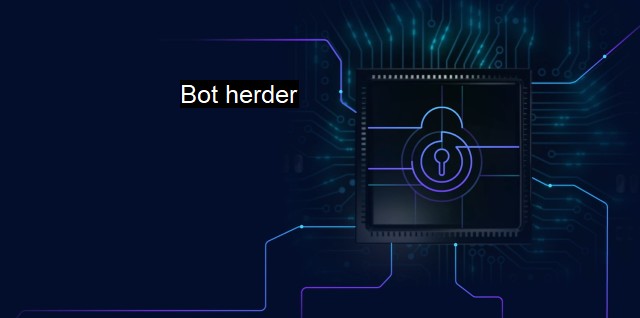What is Bot herder?
Bot Herding and Botnets: The Darker Side of Cybercrime
A "Bot Herder" refers to an individual or a group of individuals who control and maintain a botnet. Traditionally, the term is associated with cybercrime activities and aims towards individuals or organizations with malicious intentions. through this strategy, cybercriminals control various remote computers unconsciously turned into zombies, report their activities, and coordinate attacks by sending commands in a distributed manner.A botnet, originating from the words ‘robot’ and ‘network,’ denotes a network of automated and interconnected devices that collaborate in completing tasks online. These can include routines as benign as dealing with web traffic to malevolent tasks such as performing Distributed Denial of Service (DDoS) attacks. A user might unknowingly become a part of these bots following an accidental malware download, which further settles itself inside their system, covertly relaying further instructions to the user's computer. This relationship between the botnet and the herder ensures optimized efficiency and control, essentially for executing cybercriminal activities on a larger scale.
Analogously, a bot herder's role is to manage and control these bots, often extended to numerous compromised computers. Hence, amplifying their ability to perform unethical activities, such as DDoS attacks, opening backdoors to access private data, disrupting internet services, etc. Bot herders usually use specific software for controlling botnets, wherein this software is also capable of forcefully integrating the computer into the botnet net without the computer owner noticing.
Upon successful intrusion into an unsuspecting user’s system, bot herders can incorporate the system in their coordinated functioning, performing activities at a scale, speed, and repetitiveness surpassing human capacity. This scale of operations allows the minimization of traceable actions and creation of reasonable alibis, leading to being more furtive about these illicit actions, proving such activities challenging to detect and counter.
Cybersecurity researchers and antivirus companies actively work in identifying and terminating such activities. They use special methods, including advanced heuristics, signature-based detection, behavior-blocking software, etc. to arrest the suspicious action.
One countermeasure is the use of Intrusion Detection Systems that minutely scan the network for any suspicious or aberrant activities signaling a possible cyber threat. Such systems help counter possible intrusion attempts and provide alerts for the user or network administrators, thereby preventing eventual attacks orchestrated by the bot herder.
Apart from this, antivirus companies regularly update their databases, including signatures of newer malware, continuously modifying their detection engines to counter more sophisticated afflictions. Due to heuristic-scanning technology, antiviruses can predict potential attacks from previously unknown malware by recognizing behavioural traits consistent with malicious activities.
Another emerging trend surrounds "white-hat" bot herding agents - ethical hackers who purposefully engineer botnets to expose flaws and reinforce systems and networks' security further. These actions underscore botnets' potential, which extends beyond their bewildering security nightmares.
The tainted implications of bot herding necessitate greater cybersecurity awareness among all computer users, including casual internet users to organizations' higher echelons, warranting the constant reminder about the potential vulnerabilities every connected computer exhibits. Individual and collective caution while downloading unverified applications or opening questionable emails, timely software upgrades, and prioritizing research to develop fascinating technologies to counter these activities should witness an upward trend, aligning towards a safer cyber world.
In conclusion bot herders represent a considerable threat to internet safety, privacy, and data integrity. Therefore, it is immensely crucial to always stay guarded and meticulous online, employing dependable and secure internet practices to maintain our digital world's integrity and safety.

Bot herder FAQs
What is a bot herder?
A bot herder is a person, group or organization that controls a network of compromised computers or devices, known as a botnet, to conduct malicious activities such as distributed denial-of-service (DDoS) attacks, spamming, and phishing campaigns.How do bot herders infect computers?
Bot herders use various methods such as phishing emails, drive-by downloads, and exploit kits to infect computers with malware that allows them to take control of the machines and add them to the botnet. They can also exploit unsecured ports and backdoors on some devices.What are the potential risks of botnets controlled by bot herders?
Botnets controlled by bot herders can cause a significant amount of damage to individuals, businesses, and even countries. Botnets can be used to steal sensitive data, conduct large-scale DDoS attacks that can take down websites, and send spam emails or launch phishing campaigns that can compromise even more computers.How can I protect my computer or device from becoming part of a botnet?
To protect your computer or device from being infected by a bot herder, you should keep your antivirus software updated and install security patches for your operating system and other software in a timely manner. Additionally, you should avoid opening suspicious emails or links and use strong passwords for all your online accounts.| | A | | | B | | | C | | | D | | | E | | | F | | | G | | | H | | | I | | | J | | | K | | | L | | | M | |
| | N | | | O | | | P | | | Q | | | R | | | S | | | T | | | U | | | V | | | W | | | X | | | Y | | | Z | |
| | 1 | | | 2 | | | 3 | | | 4 | | | 7 | | | 8 | | |||||||